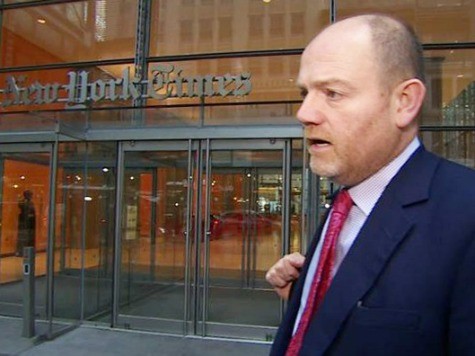
On May 14, Jill Abramson, the first female executive editor of The New York Times, was suddenly fired by the paper. A myriad of explanations have been offered for her ouster, but an intriguing one flying under the radar is the ire she reportedly raised by launching an investigation into charges that the paper’s CEO, Mark Thompson, had a role in a sex scandal that embroiled the BBC, as Breitbart News previously reported.
Ken Auletta of The New Yorker magazine noted that Abramson was not in attendance with Arthur Sulzberger, Jr., the Times’ publisher, and Managing Editor Dean Baquet during the annual City University Journalism School dinner on Monday, May 12. This was likely the first public sign that Abramson was on the way out as only two days later the paper announced she was fired.
Still, the media has been filled with many reports over the last year that the editor was grating on her bosses. Since her firing, several reasons have been proffered in the press as to why the first female editor was released by the paper of record but one in particular seems to be flying below the radar and may be of far more importance than it seems.
NPR media correspondent David Folkenflik pointed out on Twitter that one of the things Abramson did that riled her bosses was to send an investigator to London to investigate the past conduct of Times CEO Mark Thompson, who was the head of the British Broadcasting Corporation during the biggest child sex abuse scandal in the history of British media.
After Times chief Sulzberger chose former BBC chief Mark Thompson as the paper’s new CEO in 2012, Abramson sent a reporter to England to look into the charges that Thompson tried to cover up the then-growing scandal.
Just as Thompson was transitioning from head of the BBC to his new role as CEO of the Times , a sex abuse scandal was exploding in his home country. As reported extensively by Breitbart, one of the BBC’s most beloved TV and radio stars, Jimmy Savile, was rocked by sex abuse accusations that went all the way back to the 1960s when Savile was a young broadcaster with the BBC.
Subsequent investigations by British authorities uncovered hundreds of teens, both girls and boys, that were sexually abused and exploited over the decades by Savile and a handful of other BBC employees. It was a scandal that shocked the country.
It was also discovered that several officials at the BBC assisted Savile in his actions, some of which occurred in BBC facilities, perhaps with the knowledge of BBC executives.
As it happens, during the last seven years that Savile worked with the BBC–he died in 2011–Mark Thompson was the director of the government-owned broadcasting agency. And during his tenure, critics charge that Thompson quashed internal investigations into the mounting charges of Savile’s sex abuse.
By 2012 when Thompson was making ready to quit the BBC to cross the ocean and become The New York Times’ CEO, he swore to the paper’s board of directors that he had no prior knowledge of Savile’s crimes, nor did he do anything to cover it up to keep it from the British public.
But, apparently, Abramson didn’t take that claim for granted and sent Matthew Purdy, a tough investigative reporter, to Britain to verify Thompson’s claims. According to New York magazine, “Mark Thompson was f***ing pissed. He was really angry with the Purdy stuff.”
The magazine went on to say that Thompson “was livid, in a very passive-aggressive way. These were a set of headaches Jill had created for Arthur (Sulzberger).”
It was reported that Abramson and Thompson’s relationship continued to deteriorate after she sent the investigator to England and that this was a chief reason she was eventually let go.
“She conflicted directly with Thompson on numerous occasions,” an insider told New York magazine.
Of course, there were several other reasons for Abramson’s dismissal discussed in the media, as well.
Many have said that a chief reason Abramson was fired is because she was “too abrasive” in the newsroom and had a bad relationship with her employees and bosses.
One example of those “issues” occurred in April when an argument between Abramson and Baquet resulted in the latter slamming his fist into a wall.
Another issue that came to light after Abramson’s firing was that of equal pay for equal work. The Daily Beast reported that Abramson complained to her bosses that she wasn’t being paid as much as the previous editor, Bill Keller, and she wanted a raise commensurate with her predecessor’s compensation package.
Abramson is reported to have engaged a lawyer to “inquire” with CEO Mark Thompson and publisher Sulzberger about the pay inequity, a move that reportedly “set them off” on her.
There was also some thought that Abramson’s pushing to hire more people for the Internet side of the paper caused conflict with Sulzberger.
Sulzberger, though, tried to shoot down that claim, saying, “[T]his is not about any disagreement over the direction of our digital future or any of the steps we have taken recently to create and launch new digital products and services.” He insisted that he and Abramson were in agreement on the direction for the electronic side of the news outlet.
The publisher went on to say, “I choose to appoint a new leader for our newsroom because I believe that new leadership will improve some aspects of the management of the newsroom,” and then insisted he would say no more about it.
Managing editor Dean Baquet, who was also in the run for the top job when Abramson was chosen, is taking Abramson’s place and will become the first African American executive editor of the paper.
Follow Warner Todd Huston on Twitter @warnerthuston or email the author at igcolonel@hotmail.com.

COMMENTS
Please let us know if you're having issues with commenting.